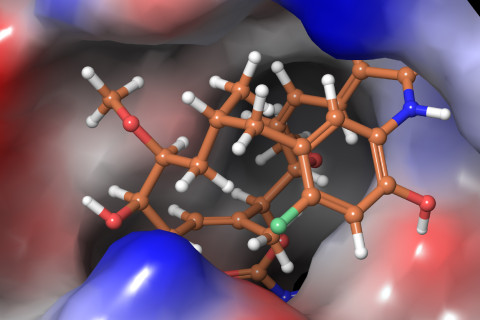Expertise for the Future of Pharmaceutical Science
Doctoral Programme in Drug Research is a multidisciplinary and comprehensive training programme that encompasses all key areas of drug research and toxicology. Our goal is to educate internationally competitive experts for roles in drug research, regulatory affairs, product development, and toxicology – both in the public sector and in industry.
Doctoral Programme in Drug Research provides opportunities for networking, developing international competencies, and building a strong scientific profile. Graduates of the programme are in high demand, not only in academia but also in regulatory authorities and the pharmaceutical industry.
85
DOCTORAL RESEARCHERS
10
DOCTORAL DEGREES PER YEAR
Research in Doctoral Programme
Doctoral Programme in Drug Research offers a high-quality research environment and expert supervision to support the professional development and academic integration of doctoral researchers.
The research areas of the doctoral programme are
- drug delivery, targeting and dynamics
- drug design and therapeutic targets
- effectiveness of treatment, pharmaceutical policy and pharmacoeconomics
- analytics
- medicinal and applied chemistry
- metabolic profiling and health effects of chemicals
- smart pharmaceutical solutions
How to apply?
A doctoral study right is granted as a result of an application in which the applicant suggests supervisors committed to the thesis project as well as research and funding plans.
You can check the requirements for a doctoral thesis here.
Following post graduate degrees can be completed in the Doctoral Programme in Drug Research:
- Doctor of Philosophy (Pharmacy)
- Doctor of Philosophy
- Doctor of Medical Science
- Doctor of Odontology
- Doctor of Health Sciences
The doctoral degree consists of studies specified in the degree structure and an approved doctoral thesis.
The required studies amount to 30 ECTS, consisting of:
- 5–10 ECTS in transferable skills studies
- 20–25 ECTS in studies related to the discipline and field of research
More information about the studies and degree requirements is available in KAMU (link to the website, opens in new tab).
In compliance with the Universities Act 558/2009, persons who have completed the following shall be eligible for studies leading to an academic postgraduate degree
- An applicable Master’s degree awarded by a Finnish university; or
- An applicable Master’s degree awarded by a Finnish university of applied sciences; or
- An applicable education completed abroad which in the awarding country qualifies for equivalent higher education studies.
A person whom the faculty judges to otherwise have sufficient knowledge and skills for the studies can also be admitted to postgraduate studies. For a special reason, postgraduate studies can be started before the student has completed their previous degree.
The faculty may require students admitted to study for a scientific postgraduate degree to complete the necessary supplementary studies in order to acquire the knowledge and skills required by the studies.
Applicable degrees for doctoral degrees:
Doctor of Medical Science
Licentiate of Medicine completed in Finland, Master of Science in Medicine completed in EU or EEC, or Master of Science in Medicine completed elsewhere and recognised by Valvira.
Doctor of Odontology
Licentiate of Odontology completed in Finland, Master of Science in Odontology completed in EU or EEC or Master of Science on Odontology completed elsewhere and recognised by Valvira.
Doctor of Philosophy
An applicable Master’s degree awarded by a Finnish university; or an applicable Master’s degree awarded by a Finnish university of applied sciences; or an applicable education completed abroad which in the awarding country qualifies for equivalent higher education studies
Doctor of Philosophy (Pharmacy)
Master of Science (Pharmacy) completed in Finland; or an equivalent degree completed in another EU or EEA country, on the basis of which a document indicating formal qualifications has been issued in that country, as referred to in the Union's recognition regulations, which is required in that country for the right to practise as a pharmacist independently; or a degree completed outside the EU or EEA, which has been recognized by an EU or EEA country and has granted the right to practise as a pharmacist or the right to use the title in that country.
Doctor of Health Sciences
An applicable Master’s degree awarded by a Finnish university; or an applicable Master’s degree awarded by a Finnish university of applied sciences; or an applicable education completed abroad which in the awarding country qualifies for equivalent higher education studies
Eligible applicants to the Doctoral Programme in Drug Research must have either completed or currently ongoing studies in applicable field of science. The applicant should have an ongoing or planned research project suitable for doctoral dissertation with a research plan approved by eligible supervisors.
The skills of eligible applicants to Doctoral Programme in Drug Research and their commitment to a successful completion of their doctoral studies are assessed according to the following admission criteria:
- quality, clarity and feasibility of the research plan
- scientific and practical importance of the research subject and its suitability to the research profile of the research site and the doctoral programme
- the applicant's evidence of previous research work, e.g. working as a researcher, scientific publications
- research funding
- success in MSc studies or corresponding studies
- international orientation and the language skills required for the studies
The adequacy of supervision, the expertise and commitment of supervisors are also taken into account in the selection process. At least two supervisors are appointed for applicant, one of whom is the main supervisor and at least one of whom is a university staff member. All supervisors must hold a doctoral degree. The main supervisor must hold, at the minimum, the qualification of a docent or have a corresponding scientific qualification. If the main supervisor is not a university staff member, one supervisor being university staff member must hold, at the minimum, the qualification of a docent or have a corresponding scientific qualification. Applicant's ability, motivation and commitment to doctoral studies can also be assessed through interviews.
Following documents should be attached to the application:
- Research plan, approved by supervisors
- Funding plan, approved by the main supervisor
- Copy of the basic university degree certificate and a transcript of earlier academic records. In case applicant’s MSc, or equivalent, degree is not completed the applicant should submit a transcript of academic records and a personal study plan for completing the remaining studies of that degree as well as state the estimated time of master’s graduation in the application form.
- CV, including the list of publications if any
- Statement by the Main Supervisor on the applicant's ability based on their degree to complete a doctoral degree and the need to undertake any supplementary studies (Download a template)
- Proof of sufficient English proficiency (applies to foreign applicants)
- Biopharmacy: Paavo Honkakoski
- Clinical pharmacy: Miia Tiihonen
- Pharmaceutical chemistry: Seppo Auriola
- Pharmaceutical technology: Riikka Laitinen
- Pharmacology: Markus Storvik
- Social pharmacy: Kati Sepponen
- Toxicology: Jaana Rysä
Study right to doctoral studies in Finland does not include scholarship or funding.
- The applicant discusses the possibility to pursue doctoral studies in the department or school with the potential supervisor or with the person in charge of an academic discipline. Further information may also be asked from the contact persons of the doctoral programme.
- The applicant discusses the research topic, doctoral studies and their completion, funding, as well as other supervisors with the main supervisor. The prospective doctoral student and the supervisors must negotiate and agree on responsibilities and commitment to supervising the student's research project.
- The applicant should have at least two supervisors, one of whom is the main supervisor and at least one of whom is a university staff member. All supervisors must hold a doctoral degree. The main supervisor must hold, at the minimum, the qualification of a docent or have a corresponding scientific qualification. If the main supervisor is not a university staff member, one supervisor being university staff member must hold, at the minimum, the qualification of a docent or have a corresponding scientific qualification. In case the applicant has more than three supervisors, the need for more than three supervisors and their roles should be justified in the research plan. All supervisors must give their written consent on the research plan.
- The applicant draws up a research plan. Please, see further instructions in ‘Research plan’.
- The applicant draws up a funding plan for the doctoral research project. Please, see further instructions in ‘Funding plan’.
- The right to pursue doctoral studies is applied at Studyinfo site. Please note: Partially filled application form cannot be saved. You have to have all the obligatory attachments ready once you start filling the application form.
Following documents should be attached to the application:
- Research plan, which consist of a cover page + four pages (including the list of references). The supervisors must give their written consent on the research plan in the cover page. Please, see the instructions.
- Funding plan, approved by the main supervisor
- Copy of the basic university degree certificate and a transcript of earlier academic records. In case applicant’s MSc, or equivalent, degree is not completed the applicant should submit a transcript of academic records and a personal study plan for completing the remaining studies in the previous degree as well as state the estimated time of master’s graduation in the application form.
- CV, including the list of publications if any.
- Statement by the Main Supervisor on the applicant's ability based on their degree to complete a doctoral degree and the need to undertake any supplementary studies (Download a template)
- Certificate or proof of English language skills (foreign applicants)
Processing of the application
The faculty requests amendments to the study right application, if needed. All amendments (information/attachments) requested must be submitted within two weeks from the date of the amendment request on the StudyInfo. Incomplete applications will not be processed. The dean decides whether the right to pursue doctoral studies should be granted on the basis of a proposal made by the doctoral programme within approximately three months from submitting the application. When the right to study is granted, the faculty decides on any supplementary studies required, confirms the research topic, appoints the supervisors, and approves the research plan. The faculty communicates its decision to the applicant, the supervisors, the Student and Learning Services and the doctoral programme. The applicant must confirm the study right in the Studyinfo portal within seven days from the decision being sent. Similarly, negative decisions and their justifications are communicated to the applicant, the supervisors, and the doctoral programme. In addition, the applicant is provided with instructions on how to appeal the decision.
When applying for doctoral degree studies, a research plan must be attached to the application. The applicant prepares the plan with his/her supervisors, and it must be approved by them. The research plan must cover the entire doctoral dissertation. The research plan is drafted in English or Finnish.
Coverpage: Includes name of the applicant, title of the research plan, information of the supervisors and their signatures. We recommend to use UEF Sign, the electronic signature system.
Research plan: The maximum length of the research plan is four pages including the list of references. The research plan can include the following information, for example:
- Background
- a short summary of the background to the research with necessary sources (including the theoretical and methodological basis)
- a description of earlier research related to the topic
- a description of what remains unknown about the research topic and an explanation of the research’s relevance on a national and/or international scale
- Aims
- the research hypotheses
- the aims of the research clearly defined and presented
- Materials and methods
- a description of the research methods and materials used, and the grounds for choosing the particular methods
- a description of how the materials will be handled and used (also after the research has been completed)
- a working plan, a plan for different stages of the work
- Schedule
- a description and a schedule for the different stages of the work
- The ethical aspects of the research
- the ethical aspects of the research (e.g. whether the research requires statements from ethics committees or statutory research permits; possible permits should be attached to the research plan)
- Publication plan
- the means and mode of publishing and/or presenting the research results
- Applications of research results
- an estimation of the applications and the social significance of the research results
- References
- a list of the research field’s principal literature used for the research
- The names of the persons and units participating in the research project
A funding plan is a compulsory part of the application and a funding plan approved by the supervisor is submitted as a separate attachment in Studyinfo.fi. Funding should be planned with the supervisors. The funding plan must include a preliminary budget for the whole duration of the planned project. The budget should detail the project’s expenses, such as salary/grant, research costs, and any other potential expenditures, along with the funding source for each cost item.
Research funding can be applied from various foundations as grants or from the university as paid doctoral research positions. Funding may also be available from established research projects.
More information on different funding options in Kamu.
Application period
Application periods are from Jan 1 to May 31 and from Aug 1 to Nov 30 at Studyinfo portal. Applications are processed also within application periods. Decisions of admissions are sent within three months from submitting the applications.
What is Studyinfo.fi?
Studyinfo.fi is the official national admissions portal with all the up-to-date information about study programmes leading to a degree in Finland.
Apply via Studyinfo.fi
Fill in the application form for the programme at the Studyinfo portal.
News and events
Dissertation press releases in the Faculty of Health Sciences
Public examinations of doctoral dissertations in the Faculty of Health Sciences
Further information on the doctoral program
The director of the doctoral programme is Jarkko Rautio, vice director is Anu Kauppinen. Coordinator of the doctoral programme is Katja Savolainen.





